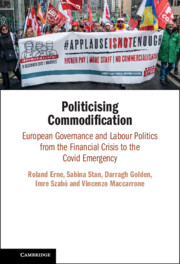52 results
14 - Conclusion
- from Part IV - Comparative Analysis and Post-Pandemic Developments
-
- Book:
- Politicising Commodification
- Published online:
- 30 May 2024
- Print publication:
- 06 June 2024, pp 353-358
-
- Chapter
-
- You have access
- Open access
- HTML
- Export citation

Politicising Commodification
- European Governance and Labour Politics from the Financial Crisis to the Covid Emergency
-
- Published online:
- 30 May 2024
- Print publication:
- 06 June 2024
-
- Book
-
- You have access
- Open access
- Export citation
12 - Legislatures
- from Part II - Actors and Institution
-
-
- Book:
- The Cambridge Constitutional History of the United Kingdom
- Published online:
- 12 August 2023
- Print publication:
- 17 August 2023, pp 309-334
-
- Chapter
- Export citation
Chapter 6 - Party Activism on the Road to War
-
- Book:
- Building Socialism
- Published online:
- 11 May 2023
- Print publication:
- 25 May 2023, pp 216-251
-
- Chapter
- Export citation
Introduction
-
- Book:
- A Nation of Petitioners
- Published online:
- 02 February 2023
- Print publication:
- 09 February 2023, pp 1-24
-
- Chapter
- Export citation
Conclusion
- from Part III - Petitioning
-
- Book:
- A Nation of Petitioners
- Published online:
- 02 February 2023
- Print publication:
- 09 February 2023, pp 276-282
-
- Chapter
- Export citation
10 - Petitioning and Political Culture in an Age of Democratisation
- from Part III - Petitioning
-
- Book:
- A Nation of Petitioners
- Published online:
- 02 February 2023
- Print publication:
- 09 February 2023, pp 253-275
-
- Chapter
- Export citation

A Nation of Petitioners
- Petitions and Petitioning in the United Kingdom, 1780–1918
-
- Published online:
- 02 February 2023
- Print publication:
- 09 February 2023

Civil Society in Southeast Asia
- Power Struggles and Political Regimes
-
- Published online:
- 22 September 2022
- Print publication:
- 20 October 2022
-
- Element
- Export citation
How EU law politicises markets and creates spaces for progressive coding
-
- Journal:
- European Law Open / Volume 1 / Issue 2 / June 2022
- Published online by Cambridge University Press:
- 10 August 2022, pp. 390-401
-
- Article
-
- You have access
- Open access
- HTML
- Export citation
10 - The Future of EU Law and Governance
-
- Book:
- EU Law and Governance
- Published online:
- 12 May 2022
- Print publication:
- 05 May 2022, pp 228-246
-
- Chapter
- Export citation
Making sense of democratisation: a case study about extracurricular music workshops in France
-
- Journal:
- British Journal of Music Education / Volume 40 / Issue 1 / March 2023
- Published online by Cambridge University Press:
- 11 April 2022, pp. 66-79
- Print publication:
- March 2023
-
- Article
-
- You have access
- Open access
- HTML
- Export citation
Chapter 18 - A Social Psychological Approach to Understanding China’s Democratisation
- from Part III - For the People
-
-
- Book:
- Psychology of Democracy
- Published online:
- 24 February 2022
- Print publication:
- 03 March 2022, pp 403-422
-
- Chapter
- Export citation
29 - A Cultural Theory of Autocracy-vs-Democracy
- from Part III - Contemporary Challenges to Democracy
-
-
- Book:
- The Cambridge Handbook of Political Psychology
- Published online:
- 17 February 2022
- Print publication:
- 24 February 2022, pp 458-475
-
- Chapter
- Export citation
12 - Conclusion: Problematising History and Identity
-
- Book:
- History and Identity
- Published online:
- 04 February 2022
- Print publication:
- 20 January 2022, pp 284-309
-
- Chapter
- Export citation
8 - The History of Concepts
-
- Book:
- History and Identity
- Published online:
- 04 February 2022
- Print publication:
- 20 January 2022, pp 179-202
-
- Chapter
- Export citation
Disaggregating democracy aid to explain peaceful democratisation after civil wars
-
- Journal:
- European Journal of International Security / Volume 7 / Issue 2 / May 2022
- Published online by Cambridge University Press:
- 17 December 2021, pp. 164-188
- Print publication:
- May 2022
-
- Article
-
- You have access
- Open access
- HTML
- Export citation
Late colonial antecedents of modern democracy
-
- Journal:
- Journal of Institutional Economics / Volume 18 / Issue 4 / August 2022
- Published online by Cambridge University Press:
- 28 September 2021, pp. 569-586
-
- Article
- Export citation
Modal verbs of strong obligation in Scottish Standard English
-
- Journal:
- English Language & Linguistics / Volume 26 / Issue 1 / March 2022
- Published online by Cambridge University Press:
- 09 July 2021, pp. 133-159
-
- Article
-
- You have access
- Open access
- HTML
- Export citation
From the United States to Rural Europe: The New Immigration, Homecoming Migrants, and Social Remittances in Hungary
-
- Journal:
- Itinerario / Volume 45 / Issue 2 / August 2021
- Published online by Cambridge University Press:
- 30 June 2021, pp. 279-303
- Print publication:
- August 2021
-
- Article
-
- You have access
- Open access
- HTML
- Export citation



